

WRITING/ENGLISH. Authorship. The Blue Book of Grammar and Punctuation. Funny Misplaced Modifiers. Grammar Girl here.
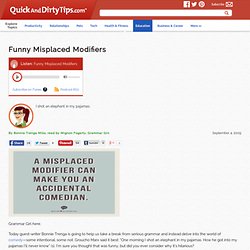
Today guest-writer Bonnie Trenga is going to help us take a break from serious grammar and instead delve into the world of comedy—some intentional, some not. Groucho Marx said it best: “One morning I shot an elephant in my pajamas. How he got into my pajamas I’ll never know” (1). I’m sure you thought that was funny, but did you ever consider why it’s hilarious? Prepositional Phrases and Misplaced Modifiers You’ve probably heard the term “misplaced modifier” before. Verb to find. Walking the Line. Dashes are much more than just lines.
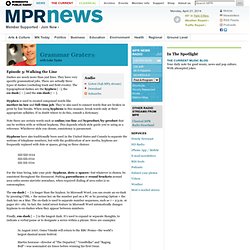
They have very specific grammatical jobs. There are actually three types of dashes (excluding track and field events). The typographical dashes are the hyphen [ - ], the en-dash [ – ] and the em-dash [ — ]. Writingstylemanual. Singular? Plural? Pick One. Grammatical number - "Content" or "Contents"? Oxforddictionaries. All words belong to categories called word classes (or parts of speech) according to the part they play in a sentence.
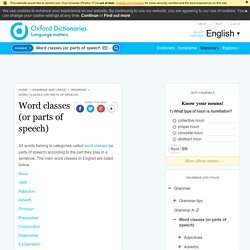
The main word classes in English are listed below. Noun Verb Adjective. Www.plusd.org/schools/rmi/subsites/Leticia-Acosta/documents/ELA/Gch1l3.pdf. SAT & ACT Writing: How to Identify and Correct Misplaced Modifiers. Present simple and present continuous.
Exercises at Grammar Bytes! Terms of Use You may not alter, sell, or post these materials on a different server.
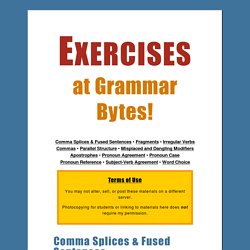
Photocopying for students or linking to materials here does not require my permission. Comma Splices & Fused Sentences Exercise 1 Exercise 2 Exercise 3 Exercise 4 Exercise 5 Even More Practice! Four more exercises for this skill exist in the Grammar Bytes! Grammar Girl & Grammar Grater.
Verbs. "Capitalization" | Advanced English Grammar with Educator.com. Nouns. Grammar - Parts of Speech. Pronouns. Prepositions. Grammar Ninja. Grammar Bytes! Diagnostic Test for Writers. When / Where: adding descriptive information for time or place. Adding descriptive information for time or place When and Where - object pronouns take place (v. exp.) – occurs, happens site (n.) – location thrive (v.) – live and grow, expand, flourish Replacing the Object Noun.
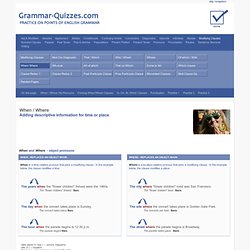
Fragments and Run-ons. What this handout is about If instructors have ever returned your papers with “frag”, “S.F.”, “R.O.”, or “run-on” written in the margin, you may find this handout useful.
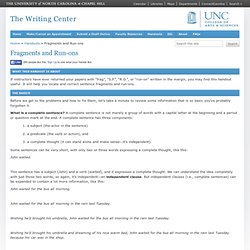
It will help you locate and correct sentence fragments and run-ons. The basics Before we get to the problems and how to fix them, let’s take a minute to review some information that is so basic you’ve probably forgotten it. What is a complete sentence? OWL Writing Exercises. Writer's Resource Lab » Parts of Speech. Download version Overview: The different parts of speech in English represent the classifications for words in the language.
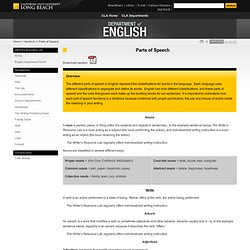
Each language uses different classifications to segregate and define its words. English has nine different classifications, and these parts of speech and the rules that govern each make up the building blocks for our sentences. It is important to understand how each part of speech functions in a sentence because combined with proper punctuation, the use and misuse of words create the meaning in your writing. Grammar - Parts of Speech - Conjunctions. Free English Lessons from the ESL Resource Center Parts of Speech Chapter 8 - Conjunctions A conjunction is a word that connects other words or groups of words.
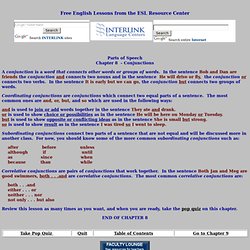
In the sentence Bob and Dan are friends the conjunction and connects two nouns and in the sentence He will drive or fly, the conjunction or connects two verbs. In the sentence It is early but we can go, the conjunction but connects two groups of words. Using [sic] Properly - Grammar & Punctuation. Past Participles. Present, past, past participle be, was or were, been sing, sang, sung drink, drank, drunk do, did, done go, went, gone make, made, made find, found, found talk, talked, talked eat, ate, eaten swim, swam, swum read, read, read write, wrote, written give, gave, given Now let's practice the past participle by using the present perfect tense.
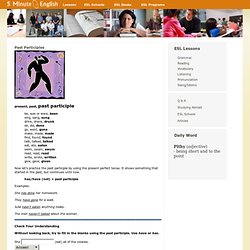
It shows something that started in the past, but continues until now. Spelling Compound Words. Related column: “Compound words cause considerable confusion” Have you ever wondered whether compound words such as “monthlong” should be spelled as one word, as a hyphenated phrase, or as two separate words?
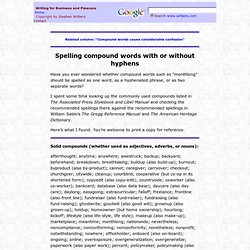
I spent some time looking up the commonly used compounds listed in The Associated Press Stylebook and Libel Manual and checking the recommended spellings there against the recommended spellings in William Sabin’s The Gregg Reference Manual and The American Heritage Dictionary. Here’s what I found. You’re welcome to print a copy for reference. Compound Words: When to Hyphenate. Grammar Lessons - Conjunctions. Usage of "were" vs. "was" English 2 S1 Online Review Packet.
Present Perfect Tense - Structure. The structure of the present perfect tense is: Here are some examples of the present perfect tense: Contractions with the present perfect tense When we use the present perfect tense in speaking, we usually contract the subject and auxiliary verb. We also sometimes do this when we write. Here are some examples: I've finished my work.John's seen ET.They've gone home. Free Language Video Lecture courses. Unfortunately. A pronoun is a word used to stand for (or take the place of) a noun.
A pronoun should refer clearly to one, clear, unmistakable noun coming before the pronoun. This noun is called the pronoun’s antecedent. 7 grammar rules you really should pay attention to.
English IV Focus.